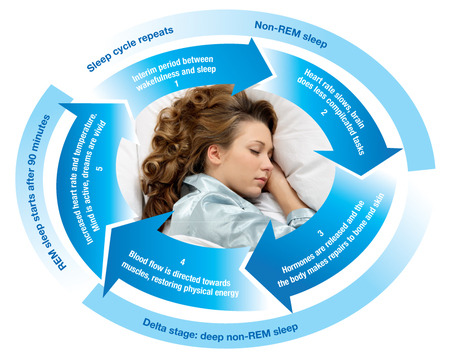#discoverer lee h

[The brain goes through a process of different levels of sleep throughout the night, and it has different physiological effects, some of which are still not completely understood. Image source: http://www.katkremp.com/wp-content/uploads/2015/03/Sleep-Cycle.jpg]
If you are reading this online close to or after your bedtime, I suggest you go to sleep and come back to this in the morning. A study published in Proceedings of the National Academy of Sciences (PNAS) shows that it may be beneficial to reduce reading from back-lit devices, like computers and smartphones, before sleep.
A quick word about the importance of sleep. Most of us are aware that sleep is important for a healthy brain function and physical health. Sleep promotes learning (i.e. you might be better off sleeping the night before a big exam) and repairing of heart and blood vessels, and controls of growth and development.
When it comes to sleep, both quantity and quality matter. Quantity-wise, if you are a teenager between ages 12-18, you need at least 8.5 hours of sleep. For adults over age 18, you need at least 7.5 hours of sleep. Even just losing 1 or 2 hours of sleep per night for several days can severely impair how you perform during the day.
The study done by PNAS found that reducing reading of backlit screens before bedtime increases the quality of sleep of its participant. This is particularly pertinent as a recent survey showed that nearly 90% of Americans use some type of electronic device at 2-3 nights per week within 1 hour before bedtime. Light, including that from electronic devices, is one of the major cues that influences the human circadian clock and may contribute to sleep deficiency.
The study showed that from subjects who read from an iPad before bedtime showed:
1.Nearly 50% reduction in plasma melatonin level. Melatonin is an important hormone in regulating the circadian rhythm. Circadian rhythm is the body’s internal clock that regulates when we sleep, when we wake, and indirectly controls when we are hungry.
2.Longer time to fall asleep. While this time was only 10 minutes, this can easily add up to large numbers after a long time. Also, subjects’ circadian clocks were delayed by more than 90 minutes the following day, which may compound the problem by causing individuals to fall asleep at a later time.
3.Significantly less rapid eye movement (REM) sleep. REM sleep is the phase of sleep that stimulates the brain regions responsible for learning. Scientists have found that individuals who have REM sleep after learning a new task have increased retention of what they have learned, versus those individuals who do not experience REM sleep.
4.Taking a longer time to feel “alert” the following morning. The researchers speculate that the negative effect is possibly due to short-wavelength blue light emitted from electronic devices, but further study needs to be done to confirm and elucidate the potentially long-term effects.
References
http://www.helpguide.org/articles/sleep/how-much-sleep-do-you-need.htm
http://www.pnas.org/content/112/4/1232.full.pdf
http://www.nhlbi.nih.gov/health/health-topics/topics/sdd/why
For additional information, check out Tuck Sleep!
–
By Lee H., Discoverer
Edited by Peggy K. Editor.
